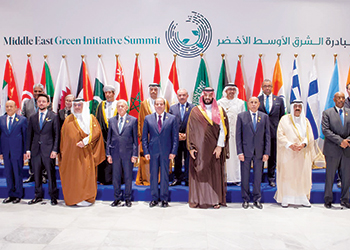
 COP27 was meant to provide relief to a hurt planet
COP27 was meant to provide relief to a hurt planet
Demands from environmental groups and scientists that governments and companies should leave oil and gas in the ground had less traction at the COP27 conference in Sharm el Sheikh
Not all was lost at the United Nations Climate Change Conference COP27 in Sharm el-Sheikh, Egypt, despite climate action groups having called it “frustrating” and some even alleged it was besieged by the fossil fuel industry.
However, delegates of the annual UN climate summit found succour in the major breakthrough agreement to provide “loss and damage” funding for vulnerable
 |
Delegates intensely debated climate action at COP27 |
Countries adopted a hard-fought final agreement that sets up a fund to help poor countries being battered by climate disasters – but does not boost efforts to tackle the emissions causing them.
Delegates praised the breakthrough on setting up the fund as climate justice being fuelled by rich nations' historic carbon emis-sions.
The German Climate Secretary Jennifer Morgan, visibly upset said despite having no agreement for tougher emissions reductions, 'we went with what the agreement was here because we want to stand with the most vulnerable'.
Mohamed Adow, Executive Director – Power Shift Africa, said the fund was something vulnerable countries have been calling for since the 1992 Rio Earth Summit and has been a part of the formal negotiations since COP19 in Warsaw in 2013.
Governments further agreed to establish a ‘transitional committee’ to make recommendations on how to operationalise both the new funding arrangements and the fund at COP28 next year.
The first meeting of the transitional committee is expected to take place before the end of March 2023.
COP27 also saw significant progress with regard to the Adaptation Fund, with new pledges totaling more than $230 million.
The cover decision, known as the Sharm el-Sheikh Implementation Plan, highlights that a global transformation to a low-carbon economy is expected to require investments of, at least, $4-6 trillion a year.
Separately, delegates expressed concern over the failure to mobilise $100 billion per year by 2020 by developed countries in cli-mate finance to the poor nations.
Global media and climate activists expressed dismay at the targets missed at Egypt’s COP27, which was supposed to be a follow-up on the agreements inked at Scotland’s COP26.
“Demands from environmental groups and scientists that governments and companies should leave oil and gas in the ground have had less traction this year, since European countries have scrambled to replace Russian gas,” reported Reuters.
The UK’s Guardian bluntly said “Cop27 will be seen as the moment when the dream of keeping global heating below 1.5C died”.
The Gulf News of Dubai hoped the next COP in the UAE makes up for COP27’s shortcomings, which it described as: “… the two weeks of negotiations at the Red Seaside resort have not achieved anything that gives hope for the success of a global action to keep global warming below 1.5 degrees C.”
What now remains is hope and that the world, especially rich nations, delivers on its promises to help reach the global climate goal of limiting temperature rise to 1.5 deg C.
Renewables are the backbone of the energy transition, however, current speed and scale of the transition are not on track to meet the goal.
COP27 brought together more than 45,000 participants to share ideas, solutions, and build partnerships and coalitions. Indigenous peoples, local communities, cities and civil society, including youth and children, showcased how they are addressing climate change and shared how it impacts their lives.
Billed as the 'African COP,' the summit in Egypt had promised to highlight the plight of poor countries facing the most severe con-sequences from global warming caused mainly by wealthy, industrialised nations.











































































